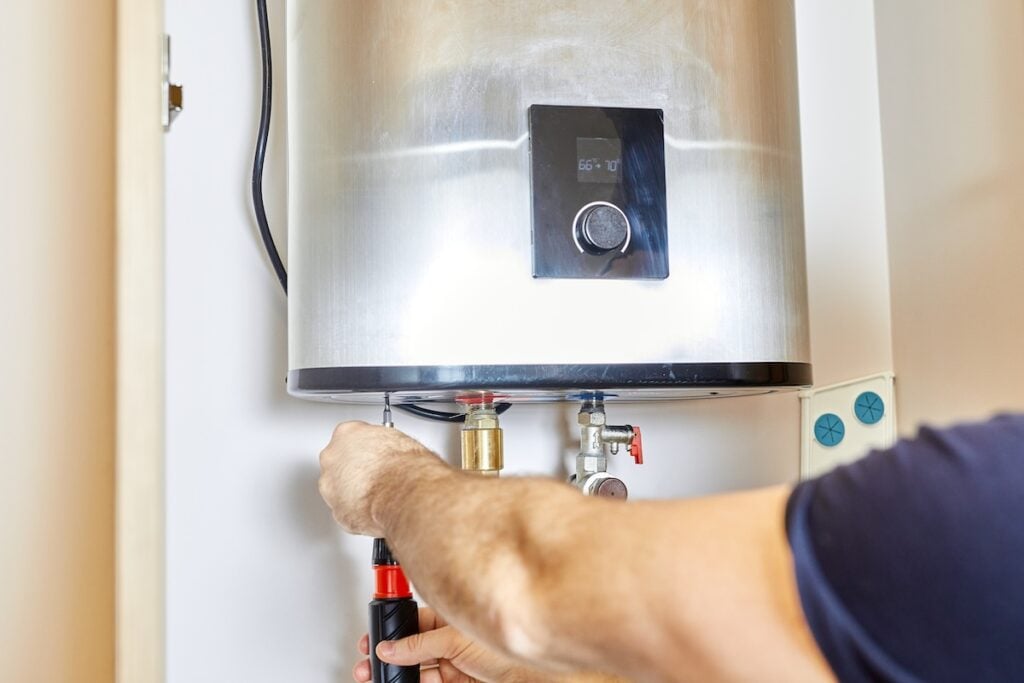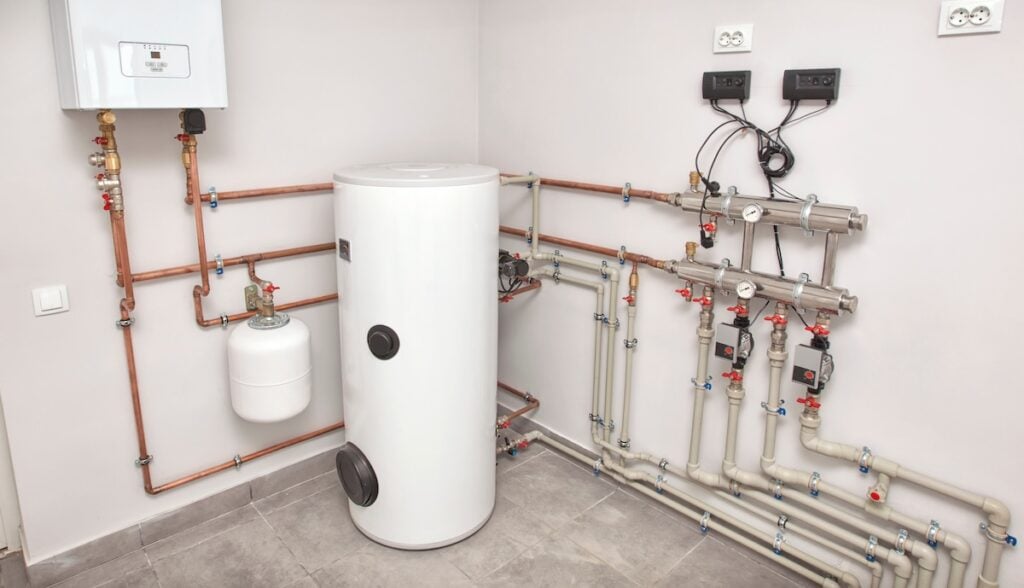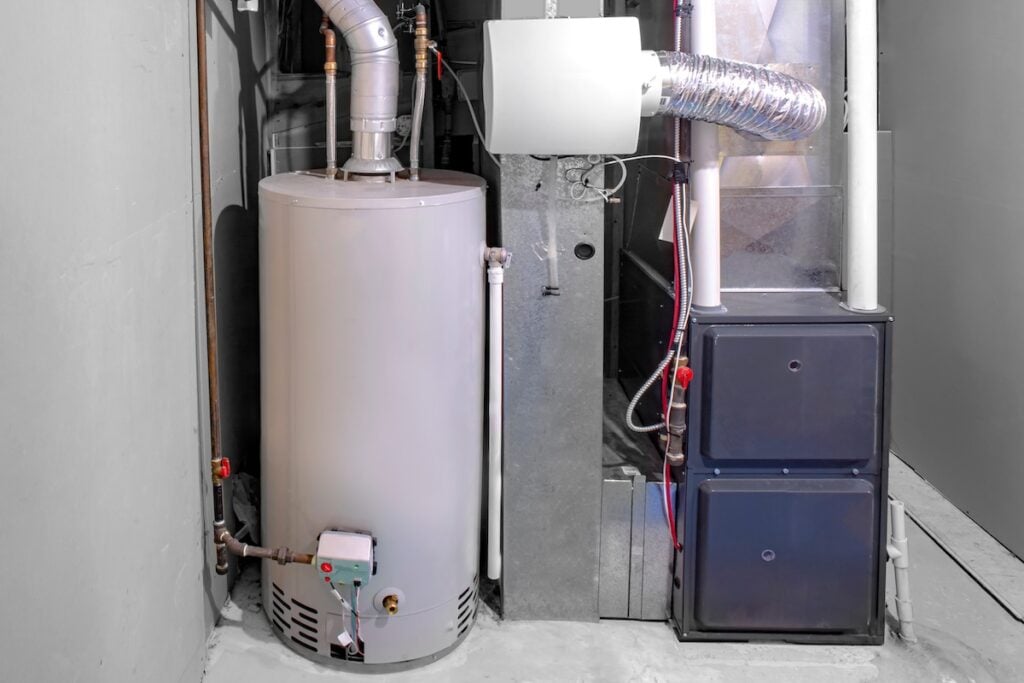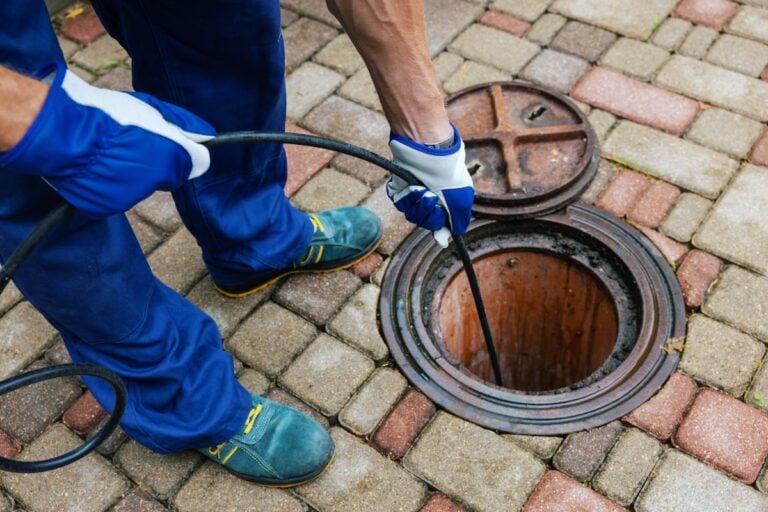
Deciding between a tankless water heater and a traditional tank-style water heater can feel like a daunting task. Each option has its unique benefits and drawbacks, but the right choice often comes down to your home’s needs, your budget, and your lifestyle preferences.
Whether you’re replacing an older water heater or considering an upgrade, this guide covers everything you need to know, including:
- The differences between tank vs tankless water heaters
- 6 key differences between tank and tankless water heaters
- A detailed comparison to help determine the best fit for your home
🔎 Tank vs. Tankless Water Heaters

When choosing a water heater, two main options are available: tank water heaters and tankless (on-demand) water heaters. Here’s a comparison of how they work, along with their pros and cons, to help you decide which suits your needs.
Tank Water Heaters
Tank water heaters are the traditional choice, storing a set amount of water (typically 30 to 80 gallons) in a tank that is heated and kept warm until needed.
- Lower upfront cost – Affordable to purchase and install.
- Easy maintenance and repairs – Simple design makes upkeep manageable.
- Limited hot water supply – Runs out if multiple showers or appliances are used simultaneously.
- Energy wastage – Continuously heats water, leading to “standby heat loss” and higher energy bills.
Tankless Water Heaters
Tankless water heaters heat water only when needed, offering more energy efficiency and a compact design.
- Unlimited hot water – Never runs out, even during high usage.
- Energy efficiency – Reduces energy consumption by only heating water as needed.
- Higher upfront costs – More expensive to purchase and install.
- Limited water flow – May struggle to meet simultaneous high demand across multiple fixtures.
⚖️ 6 Key Differences Between Tank and Tankless Water Heaters

Here’s a side-by-side comparison to help you visualize the differences between these systems.
1. Cost
Tank water heaters have a lower upfront cost, typically ranging from $300 to $1,000, making them a more affordable option for initial installation. However, they come with higher energy bills over time due to the constant need to keep water heated within the tank. On the other hand, tankless water heaters have a significantly higher upfront cost, usually between $2,000 and $3,000, including installation. Despite the higher initial investment, tankless heaters result in lower long-term energy expenses, making them a cost-effective choice over their lifespan.
2. Energy Efficiency
Tank water heaters are less energy-efficient because they suffer from standby heat loss. This means energy is constantly used to keep the water in the tank warm, even when it’s not being used. In contrast, tankless water heaters are highly energy-efficient since they heat water only when it’s needed. This on-demand system eliminates energy waste, reducing overall usage and providing a more efficient solution for homeowners.
3. Space Requirements
Tank water heaters require a significant amount of floor space for installation, as the tank itself is large and typically occupies a dedicated area in the home. This can be an issue in smaller homes or apartments with limited space. Tankless water heaters, however, feature a compact design and can be wall-mounted, saving valuable space. Their smaller size makes them an attractive option for those looking to maximize the usable square footage in their home.
4. Capacity
The capacity of a tank water heater is limited by its tank size. Once the tank is emptied during heavy usage, you’ll need to wait for it to refill and reheat before more hot water is available. This can be inconvenient for larger households or during peak usage times. Tankless water heaters, by comparison, provide hot water on demand, allowing for continuous usage without waiting. However, they may have a reduced flow rate when multiple fixtures are used simultaneously, which can be a drawback during heavy usage periods.
5. Lifespan
Tank water heaters typically last between 10 to 15 years with proper maintenance. Over time, sediment buildup and wear can reduce their efficiency, requiring eventual replacement. Tankless water heaters, in contrast, have a longer lifespan, often exceeding 20 years with proper care. This extended lifespan offers better long-term value, as the need for replacement is less frequent compared to traditional tank systems.
6. Environmental Impact
Tank water heaters have a higher environmental impact due to their constant energy usage, which contributes to greater carbon emissions. The energy required to maintain the water temperature leads to unnecessary waste, making them less eco-friendly. Tankless water heaters are more environmentally conscious, as they consume less energy by heating water only when needed. Their longer lifespan also means fewer units are discarded, reducing waste and making them a more sustainable choice for environmentally minded homeowners.
❗️ Making the Right Choice for Your Home

Choosing the right options for your home is essential to create a comfortable, functional, and personalized space. It ensures your living environment aligns with your needs and lifestyle.
Consider Your Budget
If upfront cost is your primary concern, a tank system may be the way to go. Tank water heaters are generally more affordable to purchase and install compared to their tankless counterparts. They have lower initial costs, making them an appealing choice for those on a tighter budget or looking for a quick, cost-effective solution. However, it’s worth noting that while the upfront expense is lower, tank systems may incur higher energy costs over time due to their continuous heating of water.
Prioritize Energy Efficiency
If energy efficiency and long-term savings matter most, a tankless system could be the better choice. Unlike tank systems, which keep a reserve of hot water heated at all times, tankless water heaters heat water only when it’s needed. This “on-demand” functionality can significantly reduce energy usage, especially in households with lower hot water consumption. While the initial investment for a tankless system is higher, the potential for lower utility bills and environmental benefits makes it an attractive option for those prioritizing efficiency.
Think About Hot Water Needs
For unlimited hot water on demand, a tankless system is your best bet. This type of system provides a continuous supply of hot water, making it ideal for larger households or homes with high hot water demands. Say goodbye to running out of hot water during back-to-back showers or while running multiple appliances. However, keep in mind that tankless systems can have limitations in supplying hot water to multiple outlets at the same time, so assessing your household’s specific needs is important when making your decision.
👨🔧 Water Heater Composition
Choosing between a tankless water heater and a traditional tank model is an important decision that depends on your home’s needs, budget, and energy efficiency goals. No matter which option you choose, our team at Thelen Mechanical is here to make the process seamless and stress-free.
With unmatched craftsmanship, affordable pricing, and 24/7 emergency repair services, we’re the team you can trust for all your plumbing needs in Minneapolis and the Twin Cities Metro Area. Ready to upgrade your water heater or need expert advice? Contact Thelen Mechanical today for a consultation or to schedule your installation!
Unlock Our Limited-Time Deals!
Take advantage of our offers on AC tune-ups, new installs, repairs, and more.
We Can’t Wait to Help Your Home!
"*" indicates required fields





